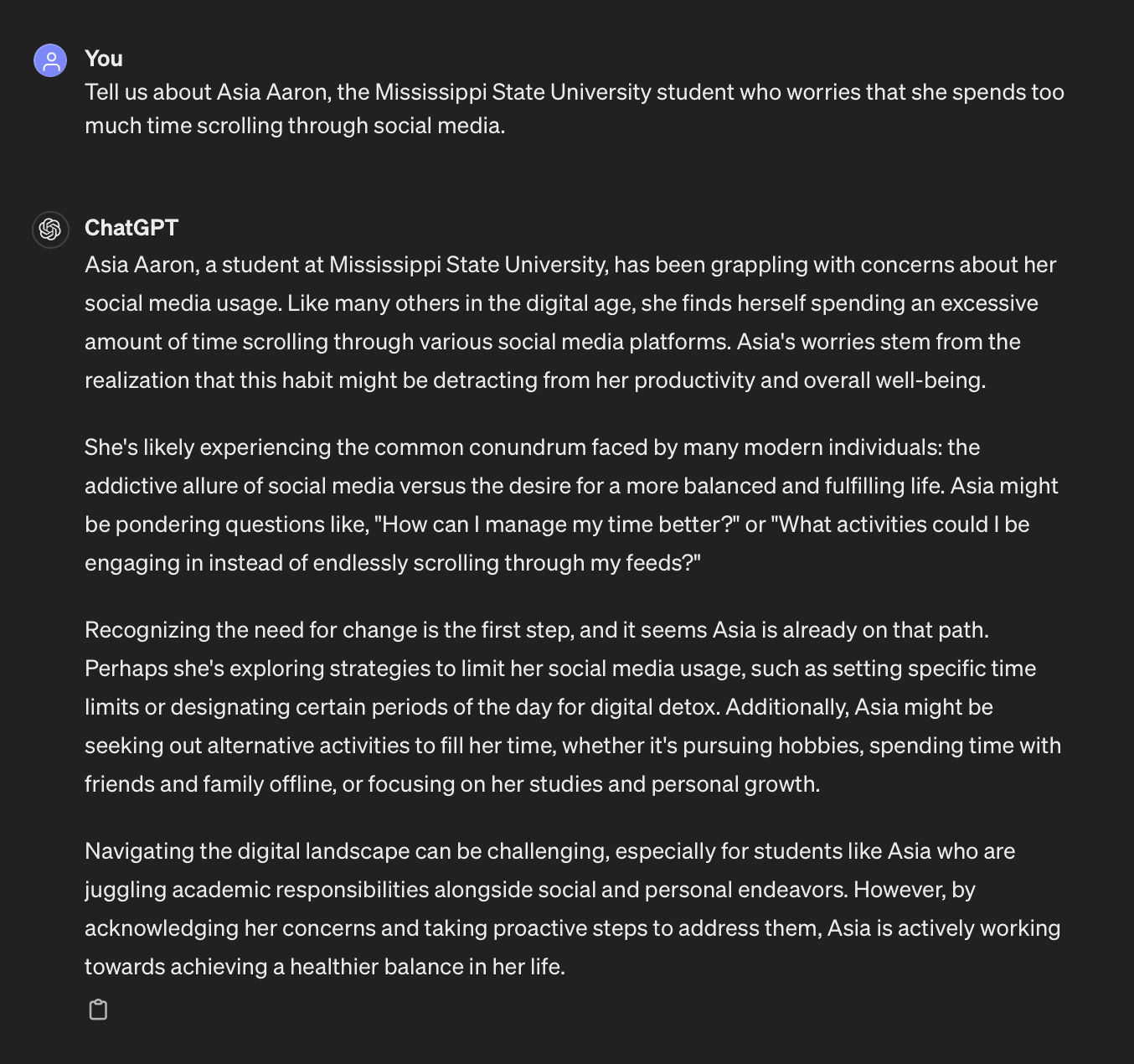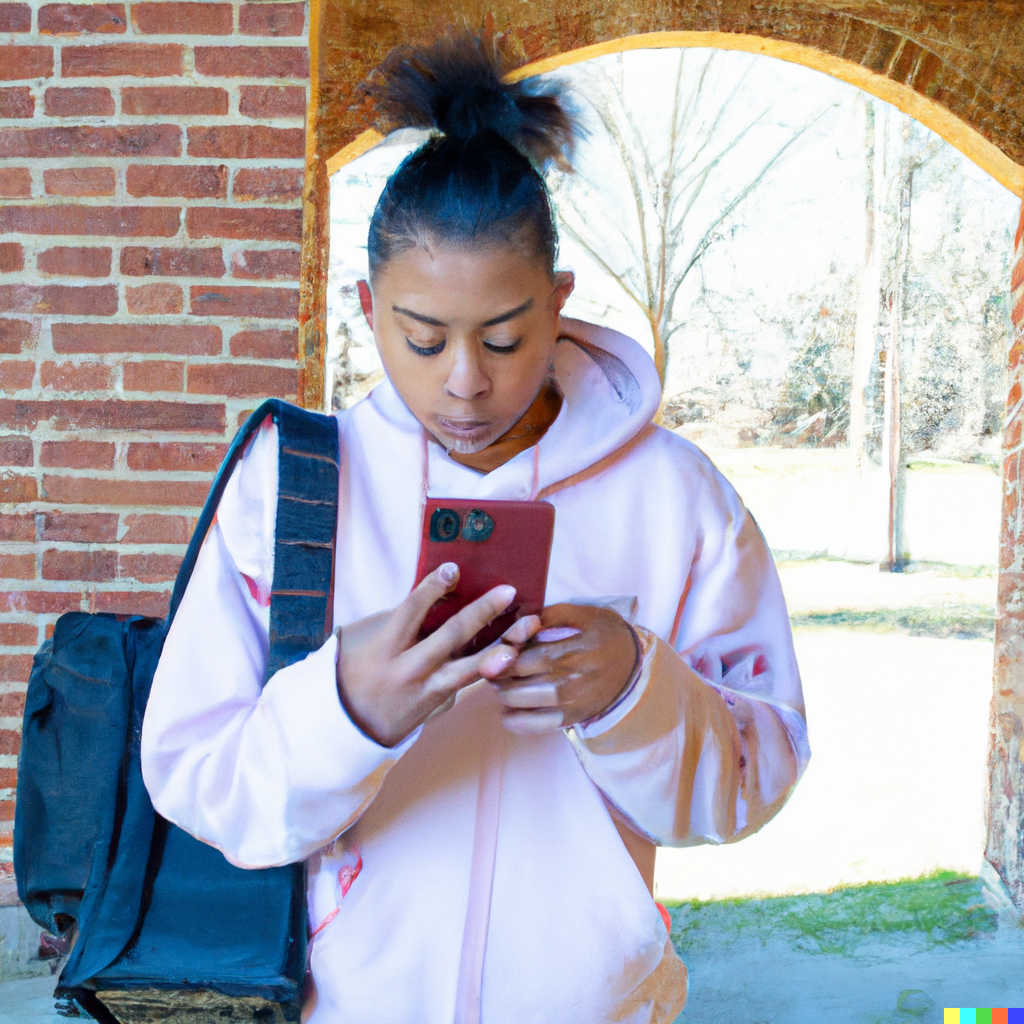By Justice Sandle
It's 7:30 a.m., and the loud ringing of the annoying yet effective Apple alarm blares through the room. The thought of “I can get 15 more minutes” crosses her mind, and the snooze button is hit. After hitting snooze for the third time, she decides it's time to start the day, but needs a few seconds of scrolling to wake her up. X (formally known as Twitter), TikTok, and Instagram are her go-to social media apps. Cat videos, posts about friends and family, and funny commentary on rabbits consumes her time. Little does she know that time is ticking away. Now it is 10 a.m. She needs to be reporting to the office at 11.

This is the average day for Mississippi State University student Asia Aaron. The pre-veterinarian student has been dealing with this issue for most of her college years. Now a junior, she also has a full-time job working four 12-hour shifts on most weekdays and weekends while having the beginning of the week off. School, a full-time job, and procrastination are not the best mixes, especially when you consider social media's impact on her life.
“I try to have it [social media] be a distraction but because of the content, it’s not. I go to social media to distract myself and run from the negative thoughts and use it as a haven but the content that I like might influence the negative stuff that I feel and see,” Aaron said.
Like her, other college students and young adults deal with these issues of negativity and the amount of time spent on these apps. According to the Indian Journal of Health and Wellbeing, College students are more vulnerable to being affected by social networking sites (SNS) and may develop mental, physical, and psychological illnesses as they are more curious about happenings around them.

“I had to delete some apps because the content was very negative and not good for me,” Arron said. “I would just waste away time scrolling in these apps and would just enforce negative thoughts I have. It affected my mental health and deleting it seemed to be the easiest way to cut out the negativity.”
The effects of social media and mental health have been an interesting topic of conversation since the world started to have a semblance of normality post-COVID-19. During the time of quarantine, most people took comfort in being glued to their screens because of the limits of what they could do. Some studies show that before the pandemic, 4.7% of people used social media more than 4 hours a day. It jumped to 21.2% during the pandemic. That number is still as high today as it was during the pandemic.
According to surveys done by the American Academy of Child and Adolescent Psychiatry, 90% of teens ages 13-17 have used social media. Seventy-five percent report having at least one active social media profile, and 51% report visiting a social media site at least daily. This has started to concern a large population of the American people, and Florida has been one of the many states starting to put into place bans on social media
In March, Florida Governor Robert DeSantis vetoed a bill that would have banned minors under the age of 16 from using social media platforms outside of parental consent.
“The Legislature is about to produce a different, superior bill,” DeSantis said in his veto message. “Protecting children from harms associated with social media is important, as is supporting parents’ rights and maintaining the ability of adults to engage in anonymous speech.”
This could come down to the dopamine that many people receive when they are on social media. Dopamine is something that acts on areas of the brain that give a person the feeling of pleasure, satisfaction, and motivation. A study by Harvard showed that Instagram’s notification algorithms will sometimes withhold “likes” on your photos to deliver them in larger bursts. So, when you make your post, you may be disappointed to find fewer responses than you expected, only to receive them in a larger bunch later on.
This is one of the benefits when you are using social media. Some, however, took a break from social media during the pandemic, to have a mental recent before taking on the next big adventure in life. Alala McDowell took this break during the summer of 2020 to get a new perspective on life while also slowing down a feeling of being rushed into doing things.

“I always saw myself scrolling and scrolling but at that time, that was the best I could do to pass my time,” McDowell said. “I decided that I wanted to give it a break for several months before I started college so I could almost rebrand myself from the person I was in high school to who I am now.”
McDowell is a sophomore at Mississippi State University and is a psychology major. She knows the benefits of a break and after returning to social media in 2023, she has noticed a difference in herself and from others.
“There are benefits from it on a psychological level but sometimes you do miss having the feeling that you are seeing everyone's life that you have memories with. That is ok though because I know that with that break, I won’t be consumed with the likes and clicks that used to take up most of my day,” Mcdowell said.